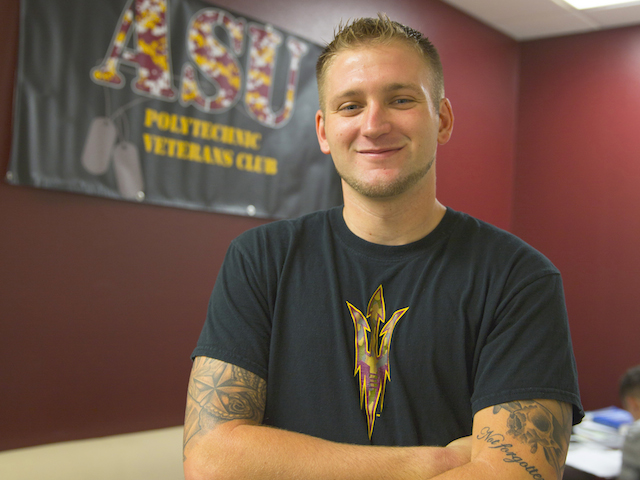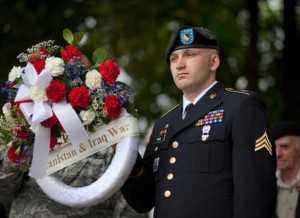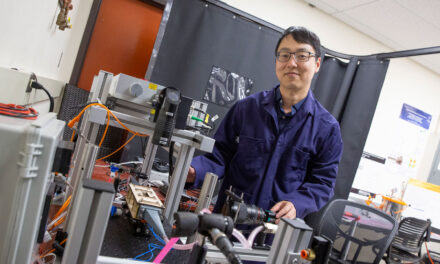
Military duty – and goal of going to ASU – put veteran back on track

Beau Bock decided his best option for a path to higher education was the military. He enlisted in the Army and was trained to work in radar technology repair. He was accepted to ASU as a transfer student four years later and is on course to earn his bachelor’s degree by the end of 2015. Photo by Jessica Hochreiter / ASU.
Beau Bock remembers Arizona State University as a place that drove him to start digging his way out of “a rough time in my life.”
In his late teens he came to visit his older sister, an ASU student at the time, and found himself unexpectedly drawn to the campus scene and the academic environment.
“Almost out of nowhere, I had this obsession that I was going to go to ASU,” he recalled.
But at that point it wasn’t going to be easy, or happen anytime soon.
Turning point
A few years earlier, back home in San Jose, California, Bock had lost interest in high school and dropped out midway through his senior year.
Although he later earned a GED high school equivalency credential, he was drifting, going from one menial job to another, with no prospects for improvement.
“I hit a wall at 19, everything was going wrong,” he said.
His situation motivated him to “get interested in education again,” but he had neither the academic record nor finances to go to college.

Beau Bock spent a year of U.S. Army service time in overseas war zones. Photo courtesy of Beau Bock.
Life during wartime
He decided his best option for a path to higher education was the military. At age 20 he enlisted in the Army in March 2009, and was trained to work in radar technology repair.
By late 2010, however, Bock found himself with a battalion being deployed for combat in the war in Afghanistan, where he would spend the next year.
Living in a war zone was often frightening, Bock said, but his tech savvy got him an assignment he liked, doing work that enabled him to hone his technical skills.
Assigned to the battalion’s communications and electronics shop, Bock and a close-knit unit of technicians maintained, prepared and repaired missile systems, radio communications devices, night-vision goggles and the electronic frequency jammers that prevented remote detonation of deadly IEDS – improvised explosive devices – used by enemy combatants.
He earned two Army commendation medals for his contributions to the combat mission, and by his third year of military service rose to the rank of sergeant and became leader of the communications and electronics operation.
Path to college
Throughout those transformative years, “that idea of going to ASU stayed in my mind,” Bock said.
Once back in the United States, he set out on path to get there. He enrolled in a general studies program at Central Texas College, which specializes in online education for military personnel.
For more than a year, he took on a full load of studies while still on full-time active duty in the Army. “It was work and study, work and study, all day, every day” during that time, he said.
Eventually, he was accepted to ASU as a transfer student for the fall 2013 semester.
At first he was considering majoring in business, but in scouring ASU’s website he found the Technology and Entrepreneurship Management program in the Polytechnic School, one of ASU’s Ira A. Fulton Schools of Engineering.
“It looked like a great fit for me,” he said, one that would allow him to build on his tech work and leadership duties in the Army.
Gaining broad range of experience
He has been satisfied with his choice of a major. “You learn from people with real experience, teaching you about technology development and business at it happens in the real world,” he said.
He is on course to earn his bachelor’s degree by the end of 2015.
Bock is getting additional education through a student internship with a growing company that manufactures, installs and services point-of-sale technology systems for businesses, primarily restaurants and hotels.
He is also gaining skills in a student worker job with the Polytechnic campus office of ASU’s Pat Tillman Veterans Center.
In that role he is assisting military veterans at ASU with the transition back into civilian life, and aiding veterans who are entering or returning to college.
He is extending that effort by serving as president of the ASU veterans’ social club at the Polytechnic campus, helping to foster a sense of community among military veterans at the university. “It is an awesome experience,” he said.
Still a soldier
Bock is not yet fully in post-military mode. After finishing his Army duty, he joined the National Guard in California as a reserve, now serving as an intelligence analyst. He reports once a month for duty at a base in the San Francisco area.
He has distinguished himself in that endeavor by winning a statewide annual competition, earning him a title as the top National Guard reserve non-commissioned officer in California in 2013.
His National Guard unit is designated for disaster and crisis response deployment. So he must be prepared to step away from studies and jobs to rush to duty if called.
“I’m still a soldier first, and I’m aware of my obligation,” Bock said. “It would be nice to graduate before getting a call for that duty, but I’m ready for it at any time.”
Media Contact
Joe Kullman, [email protected]
480-965-8122
Ira A. Fulton Schools of Engineering



































